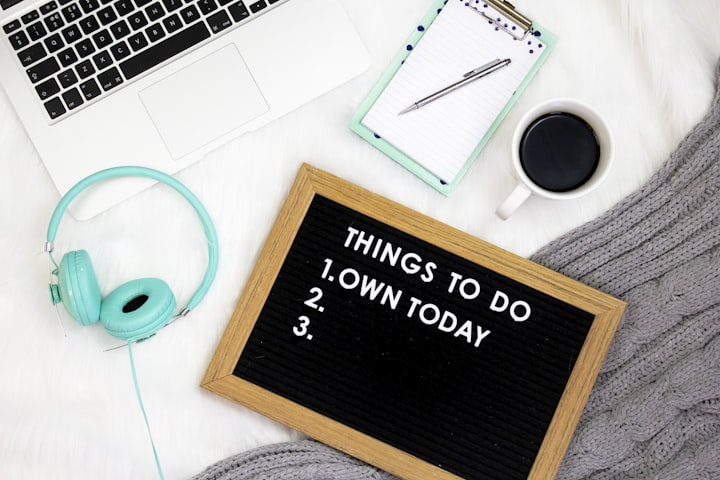6 Small Ways to Alleviate Your Depression Symptoms
Depression can be a harsh repetitive cycle

If you’ve ever experienced some degree of depression, you’ll know how hard it can be to crawl out of that darkness.
Here are six small things you can do to help ease, and maybe even breakthrough your depression—small things that can make a difference in how you’re feeling.
These suggestions are not from those well-intended people who once “felt sad.” These are from actual sufferers, like myself, and medical professionals, so you can be assured they’re “tried and true” methods.
1. Get up in the mornings .

I know this sounds too easy, but in the middle of a depression spell, it’s actually not.
So, set your alarm, get up, have a nice hot shower, and have some breakfast.
Open the curtains and let all the natural light in. All the natural light will help you not to feel so “boxed in,” and can help with feeling more positive.
2. Get a regular sleep schedule.

Part of the reason why we have trouble getting up in the morning is because our sleep schedule is all out of whack.
We either sleep constantly throughout the day and night, we sleep intermittently—a few hours here or there, or we have strong insomnia issues, and our brains won’t shut up to let us sleep.
Staying in bed constantly actually worsens the depression, so set up a regular sleep schedule. When you’re going to bed and waking up at a consistent time, even on weekends, this helps break that “feedback loop” of depression.
3. Accomplish one thing .

Make the bed and write a to-do list, and work on accomplishing one thing today.
Making the bed first thing also gives you a sense of accomplishment, and may provide more energy do something else.
A mantra I’ve repeated during my depressive state was “just do the next right thing.” Instead of looking at my whole dirty kitchen and stating “screw this” and going back to bed, I’d repeat the mantra and just work on emptying the dishwasher. Once that was done, I felt I could try loading it. Break it down into small accomplishments, and count each one as a whole completed task.
Even if making your bed was the only accomplishment you’ve managed all day, you did something!
4. Keep a journal .

I was never a “dear diary” writer, and don't even have a bullet journal, but having a small notebook to track your thoughts and feelings throughout the day can actually help get you out of your depression.
In your journal you should track a few things:
- Everything positive that happened that day—No matter how small the incident was, write it down. Whether you had a great lunch, a friendly phone call, or a movie line that actually made you laugh. You can re-read these often to boost your mood.
- Accomplishments—Remember I said to try and complete one accomplishment? Write it down no matter how small. Try and challenge yourself to “outdo” yourself from the day before.
- Negative Statements—Track how much you make “should have” statements and how long you’ve dwelled on it. You need to realize what you’ve said and done cannot be undone but it can be used constructively to be better in the future.
- Gratitude—Every day pick five small things you’re grateful for, no matter how small. I have been so depressed that I didn’t care if I woke up the next day or not, so when I realized I actually was grateful I was even alive, I knew things can get better.
Write anything to get it off your chest too. Writing can be a creative outlet for everything bottled up. If you’re not a writing type, find another outlet—drawing, painting, screaming, boxing, etc.
5. Go volunteer.

Yeah, I can image you readers scoffing at this, but believe me it actually helps.
I’ve actually found that helping others feel better actually made myself feel better. Not only that but it gets my mind off myself and I can focus on something different.
Go out and find a place to volunteer at, and devote some time regularly—at a daycare, animal shelter, food kitchen, for a cause, or anywhere you have a personal interest in.
6. Get rid of toxic people .

This can be the hardest step ever to accomplish. But having toxic people in your life is a big barrier to you breaking free from depression.
A toxic person is anyone who is abusive, unsupportive, or unhealthy emotionally—someone who basically brings you down more than up. You may not recognize one easily as they’re skilled manipulators, and blend in as a good friend or even family member.
An easy way to identify a toxic person is that after spending time with them you feel drained, emotionally wiped out, and even more depressed or negative about things.
It’s best to cut these people from your life for your mental and physical health. But if that’s not feasible you need to remember:
- You cannot change them, period. You can only change how you react to them—that’s where all the power is.
- Establish boundaries and keep them. Give serious thoughts to what you will tolerate and what you won’t. Enforce those boundaries, they’ll balk and try and push back, but keep your ground.
- Understanding it’s not really about you. Many toxic people are actually projecting what they perceive wrong with themselves onto other people. This gives them an object to attach all their self-hatred. Once you understand it’s not you, your perspective changes, and you see them in a different light.
- Stand strong. Once the toxic person realizes their tactics are not effective, they’ll throw tantrums, and even escalate their behaviors. Stand strong, it’s not about them anymore, it's about a happier, healthier you.
Final Thoughts
These actions may seem small, but when you’re in a depressed state where your only focus is how unhappy you are, a simple change to distract from that monotony is a fresh step in the right direction.
When it gets to be too much, there's a Text HelpLine available 24/7.
Just remember there is help out there!
About the Creator
Tracy Stine
Freelance Writer. ASL Teacher. Disability Advocate. Deafblind. Snarky.






Comments
There are no comments for this story
Be the first to respond and start the conversation.